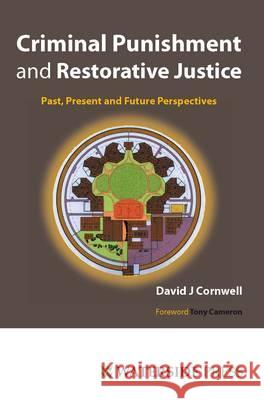Criminal Punishment and Restorative Justice: Past, Present and Future Perspectives » książka
Criminal Punishment and Restorative Justice: Past, Present and Future Perspectives
ISBN-13: 9781904380207 / Angielski / Miękka / 2006 / 190 str.
David J Cornwell appraises the potential of restorative justice to make 'corrections' more effective, civilised, humane, pragmatic and non-fanciful - by looking at 'bedrock issues' in contemporary criminology and penology and demonstrate that RJ offers no 'soft options', rather the demands of remorse, acceptance of responsibility, and the repairing of harm done. It makes the case for the radical overhaul of existing approaches on the basis of principle rather than political expediency. Provides an international perspective as to the potential of restorative justice to: Deliver better ways of dealing with offenders and victims; Reduce the use of custody by challenging offenders to take responsibility for their offences and to make reparation for their wrong-doing; Consign to history the fallacies and false horizons of traditional thinking in favour of a principled, more purposeful use of sanctions. Criminal Punishment and Restorative Justice pulls no punches in its criticism of traditional approaches and their failure to achieve crime prevention. 'This short book is well worth the time and effort to read and ponder, especially for anyone who actually works in or administers 'punishment' within criminal justice programmes': restorativejustice.org. 'Cornwell's attack on traditional philosophies, exploration of restorative philosophy in punishment theory, and different examinations of how restorative justice can transform penal policy provide an optimistic road map for the future of criminal justice': International Criminal Justice Review. 'A valuable and relevant text for practitioners, academics and students': Vista. David J Cornwell has extensive experience working in both HM Prison Service and the private sector. He is a member of the International Corrections and Prisons Association (ICPA) and continues to act as a consultant criminologist.
David J Cornwell appraises the potential of restorative justice to make corrections more effective, civilised, humane, pragmatic and non-fanciful - by looking at bedrock issues in contemporary criminology and penology and demonstrate that RJ offers no soft options, rather the demands of remorse, acceptance of responsibility, and the repairing of harm done. It makes the case for the radical overhaul of existing approaches on the basis of principle rather than political expediency. Provides an international perspective as to the potential of restorative justice to: Deliver better ways of dealing with offenders and victims; Reduce the use of custody by challenging offenders to take responsibility for their offences and to make reparation for their wrong-doing; Consign to history the fallacies and false horizons of traditional thinking in favour of a principled, more purposeful use of sanctions. Criminal Punishment and Restorative Justice pulls no punches in its criticism of traditional approaches and their failure to achieve crime prevention.This short book is well worth the time and effort to read and ponder, especially for anyone who actually works in or administers punishment within criminal justice programmes: restorativejustice.org.Cornwells attack on traditional philosophies, exploration of restorative philosophy in punishment theory, and different examinations of how restorative justice can transform penal policy provide an optimistic road map for the future of criminal justice: International Criminal Justice Review.A valuable and relevant text for practitioners, academics and students: Vista.David J Cornwell has extensive experience working in both HM Prison Service and the private sector. He is a member of the International Corrections and Prisons Association (ICPA) and continues to act as a consultant criminologist.











